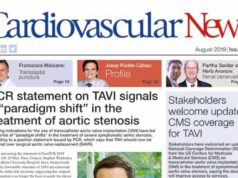Early experience with the Allegra transcatheter heart valve (New Valve Technology) suggests it is safe for use in patients who have clinically significant degenerated bioprostheses in the aortic position, performing as intended on 30-day outcomes in the VIVALL pilot study. Ulrich Schaefer (University Medical Centre Hamburg, Hamburg, Germany) presented the findings at EuroPCR 2019 (20–24 May, Paris, France).
He explained: “Bioprosthetic valves degenerate within 10 to 20 years. Valve-in-valve treatment appears a promising approach to spare these patients from a redo open heart surgery.”
The VIVALL prospective multicentre single arm study was conducted in five centres in Germany to assess the technical feasibility of using the heart valve to treat degenerated surgical valves, as well as its safety and performance profile. The Allegra valve has a supra-annular design and is self-expanding, with access via the transvalvular route. The intention-to-treat population consisted of 30 patients, with 29 patients available for follow-up at 30 days. Avergae age was 78 years and 50% were male. Follow-up will also be assessed at six and 12 months.
The primary safety endpoint was 30 day survival, expected to be >72.7% in the intention-to-treat population, and the primary performance endpoint was invasively measured postoperative mean pressure gradient. Secondary VARC 2 endpoints included all-cause mortality and all stroke.
Inclusion criteria were symptomatic patients with a degenerated bioprosthetic aortic valve or severe bioprosthetic valve insufficiency, and high risk for redo surgery, assessed by Society for Thoracic Surgeons [STS] score ≥10% or EuroScore, or as assessed by the heart team.
Schaefer described the study population as “demanding and complicated”, stressing that the range of the inner diameters of bioprostheses was between 16mm and 28mm, “so, a quite ambitious trial … with quite difficult bioprostheses”. Eighty percent of the surgical valves had an inner diameter of ≤21mm and 23.3% of ≤ 19mm. Only four patients had a surgical bioprosthesis labelled with 25mm or 27mm outer diameter; 43% of the surgical bioprostheses in the study population were Mitroflow valves and 6.7% were Mosaic prostheses with very small inner diameters.
Reporting the early findings, Schaefer said: “There was a very high procedural success rate of 96.6%,” adding “At 30 days, the clinical improvement was remarkable; 100% of the patients had none or trace aortic regurgitation at 30 days. That translated also into very significant improvement in functional capacity, with 71.4% in [New York Heart Association (NYHA)] functional class I and II at 30 days.”
Echocardiography demonstrated a gradient reduction from almost 40mmHg to 11.6mmHg, and the gradient was also very low in those patients with small bioprostheses. The haemodynamic properties suggest a competitive pattern to other supraannular transcatheter heart valve designs. At 30 days, the major adverse event rate was very low (mortality 0%, implantation of new pacemakers 0%), and there was no incidence of stroke or myocardial infarction.
Schaefer concluded that continued follow-ups and additional studies are warranted to validate these initial promising results from VIVALL.









